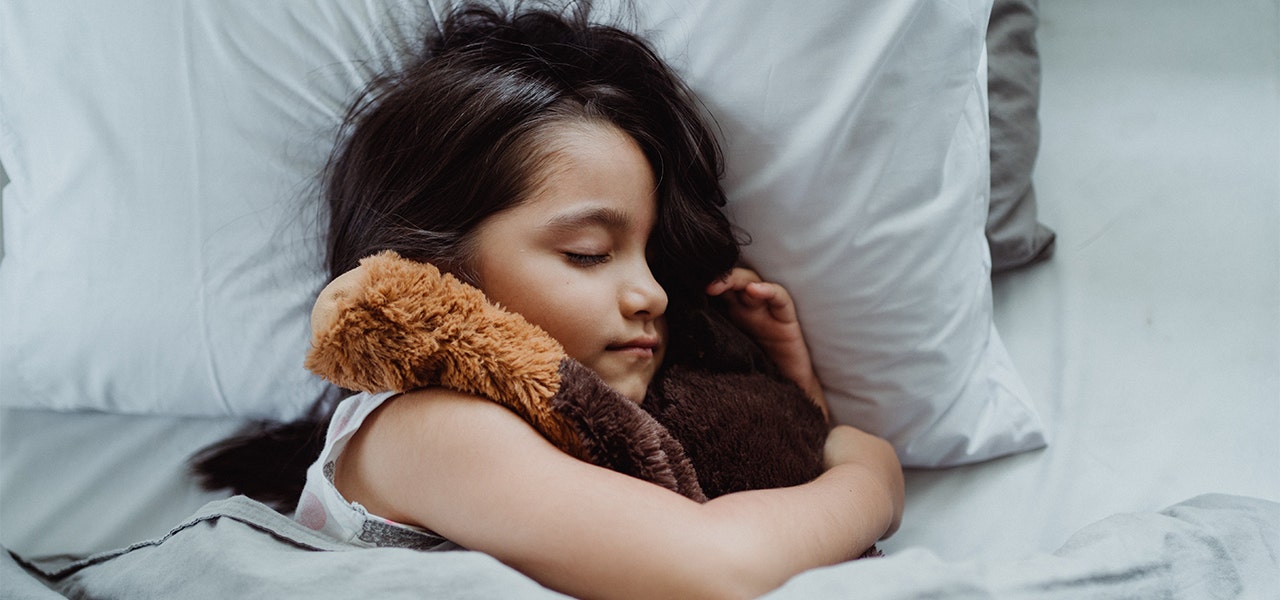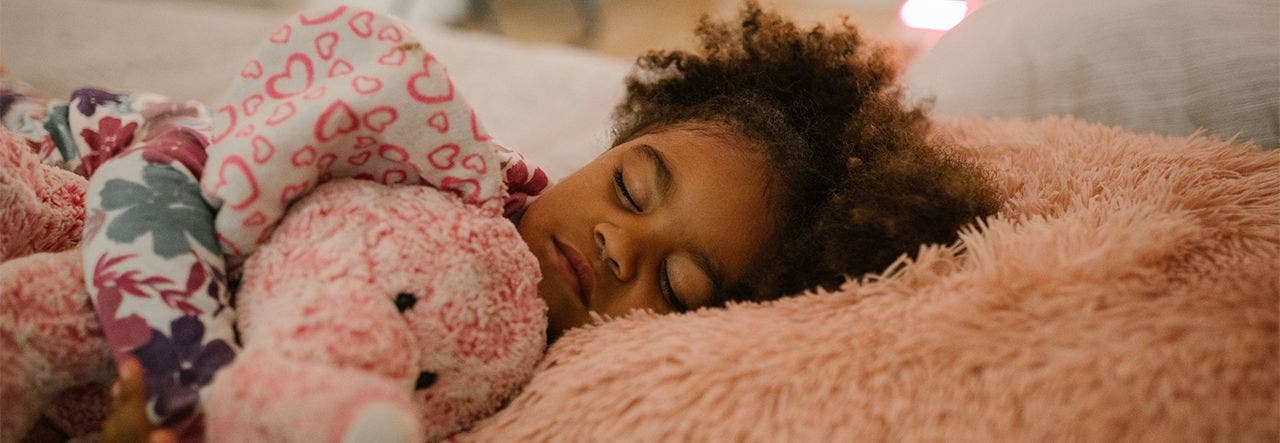Have you ever thought of sleep as a skill? If you haven’t, keep reading! We asked ParentTalk podcast hosts Dr. Arthur Lavin, a pediatrician with over 25 years of experience, and Susan Glaser, an educational psychologist and early childhood educator, how parents can help children master the skill of sleep, and they have some insightful advice to share.
As we tuck into our conversation, Dr. Lavin and Susan unravel the misconception that sleep is a mere biological necessity, positioning it instead as a pivotal skill that can be cultivated from infancy. Spoiler alert: helping your little one master the skill of sleep can bring a wealth of emotional rewards for the entire family.
Q: You both talk about sleep as a “skill.” Can you share what you mean by that?


AL: Sleep itself is a state that all people live in, every day. So from that point of view it is not a skill; it is a very basic, foundational state of the mind. But the steps people take at many ages to fall asleep vary from person to person and from culture to culture.
The age of most interest to parents of babies and toddlers – where going to sleep is a developing skill – is four months of age. For most babies, sleep cycles with eating in a round-the-clock way up to this point in life. But all of that changes at four months of age, when the sleep cycling functions of the brain actually mature to the level we have as adults. Plus, now that they have grown and built up stores of fuel, they can go all night without eating. And so the door opens to Baby sleeping all night without waking.
But here is where skill comes into play: your newborn that has woken up every few hours may continue to do so even when they no longer need to. Sleeping through the night requires them to develop one key skill, and that is the ability to fall back asleep after waking up in the middle of the night.
Q: What are the emotional rewards when a child masters this skill?
SG: Think of a baby’s face when they take their first step or the joy a child feels when they can ride a two-wheeler. When your older child develops independent sleep, they will feel confident, competent and excited – especially if the road was long and challenging.
AL: There are lots of emotional rewards. A very powerful reward awaits the tired parent – the gift of a full night’s sleep, every night. But the baby benefits as well, as so well outlined by Susan’s thoughts on this subject. And the stress your baby may experience feeling bereft at night if up and unable to get to sleep goes away, too.
Q: Why is talking about sleep in “averages” a bad thing?
AL: Most child development books share patterns of development in the language of “averages.” For example, when talking about motor milestones, we read that sitting happens, on average, at six months of age and walking, on average, at 12 months of age. The problem is that whatever the skill, the average is just the number that half the population is over and half the population is under. So for walking, that average age of starting may be 12 months old, but that means fully half of all people start walking before their first birthday and the other half after it.
The same is true for sleep. At a certain age, the average number of hours asleep each night may be 13 hours, but that means half of all babies need less than 13 and half need more. The average number is useful to get a rough sense of range to expect, but these numbers are not useful to strictly apply to individuals.
SG: Not surprisingly, children differ in their sleep needs as much as adults do. We all know people who seem to manage on just a few hours of sleep and others who cannot function without eight hours or more!
A parent may read about a child who sleeps from 6 p.m. to 6 a.m. and think that there is something wrong with their child (or their parenting), because no matter how many sleep courses they follow, their child does not go down until 9 p.m. and only sleeps for nine hours. But children are born with unique sleep needs. Parents need to find the right schedule for their family, which can take a lot of time and patience. Parents must give themselves a break if their child does not fall into the “perfect” parameters.
Q: How can a parent tell what their own child needs in terms of sleep?


SG: Look for signs of sleep deprivation in your child to know if their sleep schedule needs to be adjusted. In an infant, this may be a baby who consistently falls asleep at the breast or the bottle or may be fussy even if they are being held. The overtired baby may take longer to fall asleep at night or nap times and, ironically, may wake up after a short sleep time and need their parent to re-settle.
In a toddler, sleep deprivation can lead to multiple “meltdowns” in a day. It is tricky to know for sure that your toddler is overtired or just exercising their natural right to tantrum! However, if your child seems to be constantly on the verge of a tantrum, you may want to adjust their sleep schedule and see if that makes a difference.
Q. What can you do during the day to help your child feel secure at night?
SG: Keep in mind that children experience sleep as a separation. A child can have this fear of separation even if they are old enough to understand that their parent is in the house. This can be very frustrating for parents, but there are many things you can do to help your child feel more secure at nighttime.
For all ages, being present for your child – both physically and emotionally – allows your child to develop a trusting, secure relationship with the most important people in his life. If you recognize their needs and listen to their cues, your child will grow up knowing that they have a strong emotional support, which gives them the tools to develop into an independent, confident individual.
For infants, parents can establish calming and consistent routines so that your little one can learn to anticipate and adjust to the sleep separation. Many parents choose to have their child’s crib in their room, which certainly helps a child feel more secure. If and when you return to work, choosing childcare with consistent caregivers will also help your child feel more secure and develop a secure attachment style.
This is not just true for infants. Toddlers and preschoolers also benefit from being in a school that encourages a slow entry into school and teachers who recognize the strong feelings that accompany first days.


Q. What are some healthy bedtime practices parents can implement to encourage sleep?
SG: Children love routines and parents can start implementing them as soon as they want. If you have a newborn, the routine is more for the adults, but it will soon become an important part of your baby’s day.
Calming baths, singing, book reading, baby massages or toddler back rubs can all be part of your schedule. You will soon figure out which elements help your child relax and help them get ready for bed.
For older children, we find that providing a visual schedule is helpful for the child to wind down and understand that it is bedtime. You might have a picture of a toothbrush, the bathtub, books, musical notes for a song – whatever constitutes your nightly ritual. I like to use Velcro, so if the routine must change slightly (no bath, for instance) you can move the pictures around to match your night.
Parenting Goal: Healthier Sleep for All!
Remember parents: sleep, much like any other skill, requires patience, understanding and tailored nurturing. You can learn more by checking out ParentTalk’s full episode on the subject here. You can also check out Dr. Lavin's monthly guest blog posts on a variety of sleep and health topics here.
Of course, at Naturepedic, we also believe that healthier sleep starts with a healthier mattress! Browse our collection of certified organic mattresses for babies and kids.
 BABY
BABY  KIDS
KIDS  ADULT
ADULT  LEARN
LEARN  STORES
STORES 

